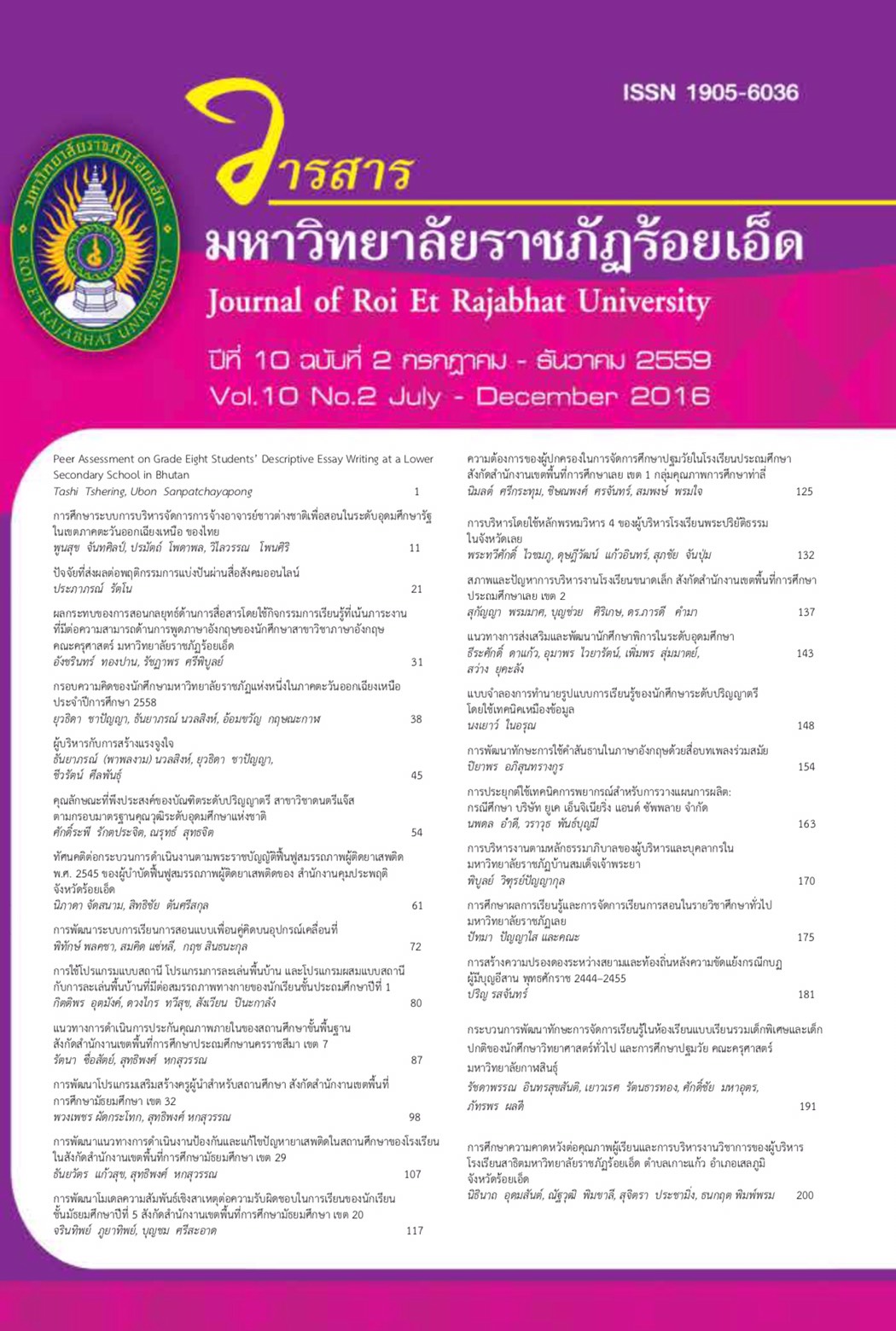Attitudes towards the Implementation of the Drug Addicted Rehabilitation Act B.E. 2545 : A Study on the Rehabilitation Treatment for Drug Addicts of Roi Et Probation Office
Keywords:
Attitude, Drug Addicted Rehabilitation, Drug Addicted Rehabilitation Act B.E. 2545Abstract
This study investigates attitudes towards the implementation of the Rehabilitation Act of B.E. 2545 on addiction treatment, rehabilitation of drug addicts by the Roi Et Province Probation Office. The research study focused on attitudes about the rehabilitation process in the implementation of the Rehabilitation Act of B.E. 2545 on the addicts by using qualitative research methods from multiple data sources, such as laws and regulations, texts, and technical documents. In–depth interviews were also conducted to observe phenomena that affect attitudes about the implementation of the Rehabilitation Act.
The study showed that:
- The process of drug investigations is as follows: When the police make an arrest they accuse the suspects in one of the following categories: drug abuse, drug abuse and possession, drug abuse and possession for distribution, and drug abuse for distribution; then the police would bring the accused to court within 48 hours. If the accused is under the age of 18 years, they bring the accused to court within 24 hours in order to get a court order to conduct a forensic examination. The court will order the subcommittee for rehabilitation in addiction offenses to make aa report to the Roi Et Province Probation Office.
- In the process of identification of substance abuse or addiction, officials will prepare a record of behavior of offenders and the environment of the accused to be completed within 15 days. If the action is not finished, a request for extension can be done up to no more than 30 days but totaling not more than 45 days. When the sub–committee rules that the accused is proven to be a drug abuser, the addiction rehabilitation plan will be provided for drug addicts, and the prosecutor will announce the results of that identification in order to proceed.
- There is also a process of delaying the court proceedings. If the accused is a drug abuser or an addict, a prosecutor will file a request to delay action until the abuser has been rehabilitated. The notification is reported from the sub–committee of rehabilitation of drug abuse.
4. The process of rehabilitation of drug addicts requires that the rehabilitation of drug addicts must be rehabilitated according to the rehabilitation plan for up to 180 days from the date they were sent to the rehabilitation. If the rehabilitation is not satisfactory, it can be extended for a further period not exceeding 180 days but not more than three years. When the drug abuser is restored completely from the rehabilitation plan, they are deemed to be exonerated from the accusation. Then the committee will order the person’s release and inform the police or prosecutor. If the rehabilitation is not yet complete, the sub–committee will report to the police or the prosecutor to prosecute the offender.
References
ธงชัย สันติวงษ์. (25437). พฤตกิรรมบุคคลในองค์การ. พิมพ์ครั้งที่ 7. กรุงเทพฯ : ประชุมช่าง.
ประพาเพ็ญ สุวรรณ. (2526). ทัศนคติ : การวัดการเปลี่ยนแปลงและพฤตกิรรมอนามัย. กรุงเทพฯ : ไทยวัฒนาการ.
ปรียาพร วงศ์อนุตรโรจน์. (2534). จิตวทิยาการศึกษา. กรุงเทพฯ : ศูนย์ส่งเสริมกรุงเทพฯ.
ศรีสมบัติ โชคประจักษ์ชัด และคณะ. (2548). รายงานการวิจัยเรื่องผลการดําเนินงานตามพระราชบัญญัติฟื้นฟู สมรรถภาพผู้ติดยาเสพติด พ.ศ. 2545. กรุงเทพฯ : มหาวิทยาลัยมหิดล.
สร้อยตระกูล (ติวยานนท์) อรรถมานะ. (2542). พฤติกรรมองค์การ : ทฤษฎแีละการประยุกต์. กรุงเทพฯ : มหาวิทยาลัยธรรมศาสตร์.
สํานักงานคณะกรรมการป้องกันและปราบปรามยาเสพติด. (2551). “รัฐบาลกับนโยบายด้านยาเสพติด,” วารสาร ป.ป.ส. 24 (1)
สํานักงานคณะกรรมการป้องกันและปราบปรามยาเสพติด. กระทรวงยุติธรรม. (2554). บทคดัดย่องานวิจัยเกี่ยวกับยาเสพติด ติด พ.ศ. 2540–2544. กรุงเทพฯ : กระทรวงยุติธรรม.
สํานักงานคุมประพฤติ. (2553). รายงานผลการดําเนินงานด้านการฟื้นฟูสมรรถภาพผู้ติดยาเสพติดทั่วประเทศปี งบประมาณ 2553–ปัจจุบัน. กรุงเทพฯ : สํานักงานคุมประพฤติ.
สํานักงานสถิติแห่งชาติ. (2555). สํารวจความคิดเห็นของประชาชนเกี่ยวกับสถานการณ์การแพร่ระบาดยาเสพติด. กรุงเทพฯ : สํานักงานสถิติแห่งชาติ.
สุรีย์รัตน์ จัตุกูล. (2553). ทศันคติต่อขนั้ตอนการดําเนินงานตามพระราชบัญญัติฟื้นฟูสมรรถภาพผู้ติดยาเสพติด พ.ศ. 2545 ของผู้บําบัดฟื้นฟูสมรรถภาพผู้ติดยาเสพติดของกรมคุมประพฤติ ในเขตกรุงเทพมหานคร. วิทยานิพนธ์ สส.ม. กรุงเทพฯ : คณะสังคมสงเคราะห์ศาสตร์. มหาวิทยาลัยธรรมศาสตร์.
เสาวลักษณ์ ปลั่งเกียรติยศ. (2547). ทศันคติของผู้เข้ารับการฟื้นฟูสมรรถภาพผู้ติดยาเสพติดของศูนย์ฟื้นฟูสมรรถภาพผู้ ติดยาเสพติด (ลาดหลุมแก้ว) ต่อการดําเนินงานตามพระราชบัญญัติฟื้นฟูสมรรถภาพผู้ติดยาเสพติด พ.ศ. 2545. วิทยานิพนธ์ ศศ.ม. (การบริหารงานยตุิธรรม). กรุงเทพฯ : มหาวิทยาลัยธรรมศาสตร์.
Downloads
Published
How to Cite
Issue
Section
License
บทความที่ได้รับการตีพิมพ์เป็นลิขสิทธิ์ของวารสารมหาวิทยาลัยราชภัฎร้อยเอ็ด
ข้อความที่ปรากฏในบทความแต่ละเรื่องในวารสารวิชาการเล่มนี้เป็นความคิดเห็นส่วนตัวของผู้เขียนแต่ละท่านไม่เกี่ยวข้องกับมหาวิทยาลัยราชภัฎร้อยเอ็ด และคณาจารย์ท่านอื่นๆในมหาวิทยาลัยฯ แต่อย่างใด ความรับผิดชอบองค์ประกอบทั้งหมดของบทความแต่ละเรื่องเป็นของผู้เขียนแต่ละท่าน หากมีความผิดพลาดใดๆ ผู้เขียนแต่ละท่านจะรับผิดชอบบทความของตนเองแต่ผู้เดียว



